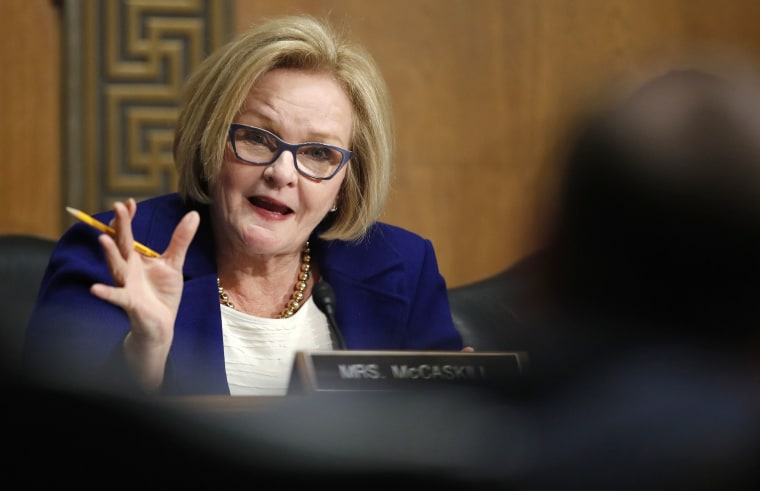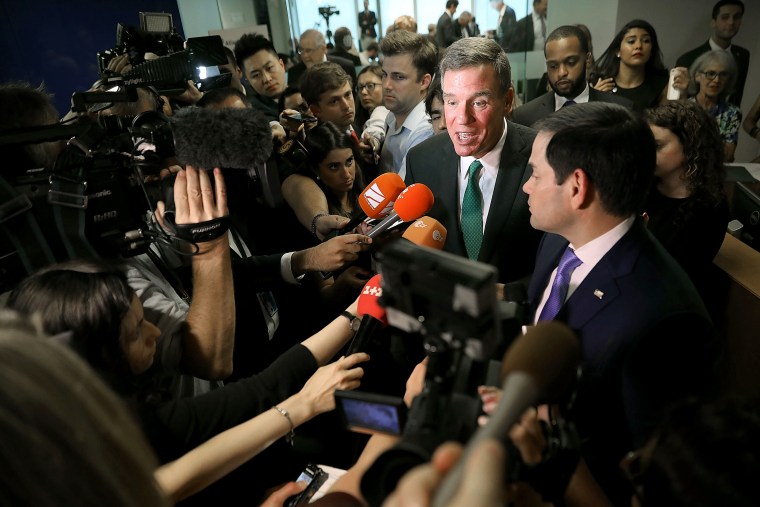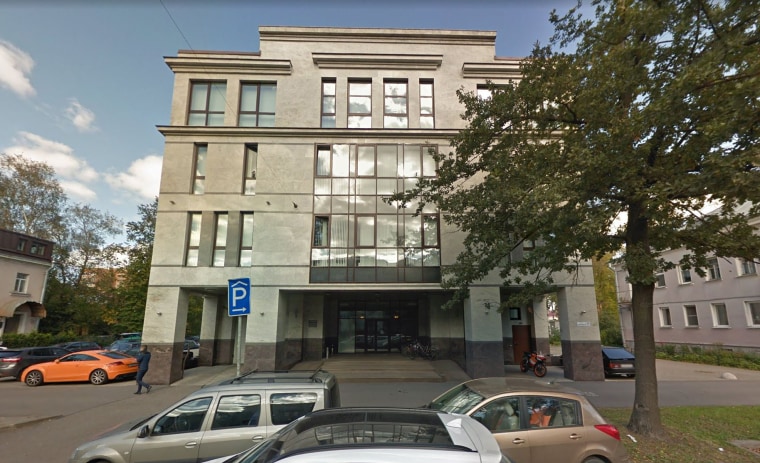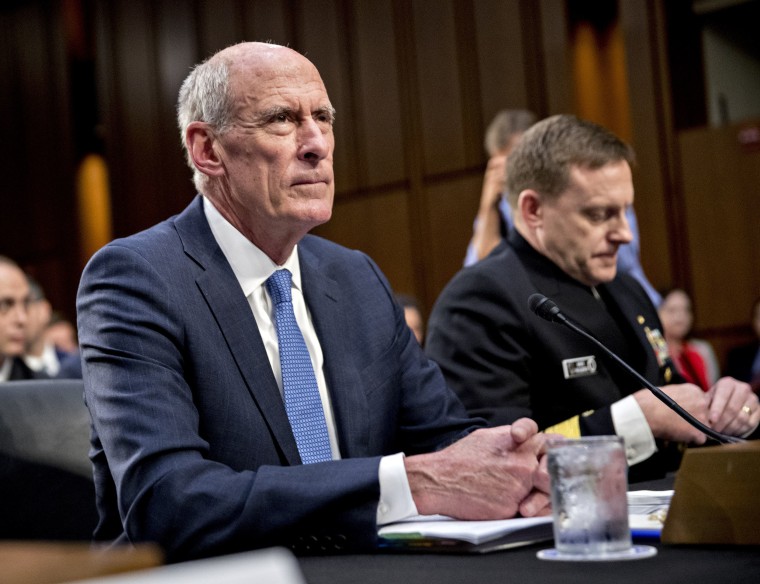WASHINGTON — After nearly two years of calling Russian election interference a hoax and its investigation a witch hunt, President Donald Trump on Friday presided over the first National Security Council meeting devoted to defending American democracy from foreign manipulation.
"The President has made it clear that his administration will not tolerate foreign interference in our elections from any nation state or other malicious actors," the White House said in a statement afterward.
But current and former officials tell NBC News that 19 months into his presidency, there is no coherent Trump administration strategy to combat foreign election interference — and no single person or agency in charge.
In the statement, the White House took issue with that, saying a strategy was put in motion when Trump took office. No such strategy has been made public — or even mentioned before.
After terrorists struck on 9/11, the U.S. government passed laws, boosted funding, and reorganized itself with the goal of making sure such an attack could never happen again. But no wholesale changes have taken place in the nearly two years since Russia sought to manipulate the 2016 election, cyber aggression that some lawmakers have called an act of war.
To be sure, individual government agencies have responded in various ways. The Department of Homeland Security is working with states to improve cyber security in voting systems. The FBI created a "foreign influence task force," and the Justice Department announced a new policy his month to inform the public about bots and trolls on social media. The National Security Agency and U.S. Cyber Command are coordinating to counter Russian influence in cyberspace, the general in charge of those agencies has said.
But even members of Trump's national security cabinet have acknowledged the need for a central, unifying effort — one that experts say is missing. Senior officials have also admitted that the government has failed to take steps necessary to give the Russians second thoughts about intervening in American politics. Trump hasn't done so, and neither did Barack Obama, whose response to election meddling — expelling diplomats and closing Russian compounds in December 2016 — has been described by some of his own former aides as tepid.
If any evidence was needed that the Russians haven't been deterred, a Democratic senator, Claire McCaskill of Missouri, said Thursday she was the target of an unsuccessful Russian hacking attempt. A Microsoft official says that company has also observed attempted Russian hacks against two other unnamed candidates.

"I do think we need to do more as a government. It requires a whole of government, because it's not just the elections," Kirstjen Nielsen, the Homeland Security secretary, told NBC's Peter Alexander at the Aspen Security Forum earlier this month.
Dan Coats, the director of national intelligence, said in a speech this month that "the system is blinking red" on Russia cyber threats but "we have to do better in what we deliver to our customers."
In April, a top National Security Agency official said the U.S. doesn't "yet have the political fortitude to say how we'll strike back" against Russian misbehavior in cyberspace. No additional fortitude has been on display in the months since. NSA director Paul Nakasone, asked about those comments last week, said he wasn't aware of them.
"We have to as a nation bring all of the elements of our power against our adversaries," he said.
In February, his predecessor, Adm. Mike Rogers, told Congress the Russians "haven't paid a price at least that's sufficient to get them to change their behavior," adding later that "we're taking steps, but we're probably not doing enough."
Last week, House Republicans voted down a proposal by Democrats to increase election funding to states by $380 million — the cost of about four F-35 fighter jets.
Democrats in Congress are deeply dismayed.
"In a normal White House, there would be a point person on the National Security Council, to coordinate all the different agencies and to work with the states and the social media companies to make sure our electoral systems aren't so vulnerable to attack," Sen. Mark Warner of Virginia, who is helping lead an investigation into Russian interference as ranking Democrat on the Senate Intelligence Committee, told NBC News.

"But President Trump's inability to acknowledge that the Russians interfered in 2016 and that they will be back in 2018 is really hampering the government's response to this threat. We just don't have a whole-of-government strategy for dealing with this problem, and it leaves us incredibly vulnerable to continued interference by the Russians or, for that matter, any other adversary who might try to steal their playbook."
Adam Schiff, the ranking Democrat on the House intelligence committee, noted that "there is no single point person in the White House working to marshal all the resources of the federal government to protect against a future attack by a foreign power, to work with tech companies to harden their defenses, and to inform the American people about the vulnerabilities. That’s singularly irresponsible because we know for a fact that Russia attacked in 2016 and ‘alarm bells’ are going off in 2018.”
Asked to comment, a spokeswoman for the National Security Council, who declined to allow her name to be used, said in an email: "The NSC leads the regular and continuous coordination of the whole of government approach to addressing foreign malign influence and election security."
Asked who at the NSC was responsible, she did not respond. The White House eliminated the job of cyber security coordinator on the National Security Council.
The White House statement released after Friday's meeting lacked details of any new security efforts.
"The President’s discussion with his NSC addressed threats posed to our elections from malign foreign actors, efforts underway to provide cybersecurity assistance to state and local authorities, and actions to investigate, prosecute, and hold accountable those who illegally attempt to interfere in our political and electoral processes," the White House statement said. "The Trump Administration will continue to provide the support necessary to the owners of elections systems — state and local governments — to secure their elections."
John McLaughlin, a former CIA director and MSNBC contributor, said that "unless the president is personally invested and mobilizing vocally and forcefully the executive branch, the government does not approach something like this with the power that is there."
Not only hasn't Trump done that — he has repeatedly cast doubt on the very idea that Russia intervened in the election, a finding endorsed by every senior member of his national security team. On Sunday night, he tweeted that the idea is "a big hoax." His press spokeswoman said he meant that to refer to the charges that his campaign colluded, but the tweet didn't say that.
The Russian attack in 2016
The Russian attack on the 2016 election — with the goal, ultimately, of hurting Hillary Clinton and helping Donald Trump — came in three waves. Two of them have been described in detail in indictments by Robert Mueller, the special counsel who is investigating whether the Trump campaign coordinated with the Russians.
The three attack vectors:
- Through the St. Petersburg-based Internet Research Agency, Russian operatives sought to manipulate American public opinion by spewing propaganda on Twitter, Facebook and other social media. Some 150 million Americans saw Russian-bought ads on Facebook, that company has said. The reach of bots and trolls on Twitter is incalculable.
- Russia's military intelligence agency, the GRU, hacked the Democratic National Committee and Hillary Clinton campaign chairman John Podesta, stole sensitive information, and released it to the public through WikiLeaks, according to the most recent Mueller indictment. The information often was embarrassing and damaging to Democrats, was heavily covered in the news media, and played an unmeasurable — but many experts believe, consequential — role in influencing voters.
- Russian hackers also penetrated the election systems of seven states, and targeted a total of at least 21. There is no evidence any votes were changed, and this element of the attack may have had the least impact. But experts have said that the Russians demonstrated that they could wreak havoc on election systems if they wanted to, even if only playing games with registration rolls to stoke disruption and chaos on election day.
While U.S. intelligence officials have said they don't see a Russian effort to go after voting systems timed to the midterms this fall, they acknowledge that there is little to stop the Russians from doing so. Meanwhile, the social media manipulation has never stopped, and the hacking attempts appear to continue.

Coats, the nation's top intelligence official, spoke at length about his worries in a speech this month, given just days before Trump stood next to Vladimir Putin and seemed to undercut his intelligence agencies on Russian interference.
"Russia has been the most aggressive foreign actor — no question," Coats said. "And they continue their efforts to undermine our democracy."
As to the upcoming midterm elections, he said, it's fairly meaningless that there are no signs of interference in specific states, because "we fully realize that we are just one click of the keyboard away from a similar situation repeating itself. "
Moreover, Coats added, "we are seeing aggressive attempts to manipulate social media and to spread propaganda focused on hot-button issues that are intended to exacerbate socio-political divisions. Despite public statements by the Kremlin to the contrary, we continue to see individuals affiliated with the St. Petersburg-based Internet Research Agency creating new social media accounts, masquerading as Americans, and then using these accounts to draw attention to divisive issues."
He continued: "These actions are persistent, they are pervasive, and they are meant to undermine America's democracy on a daily basis, regardless of whether it is election time or not. Russian actors and others are exploring vulnerabilities in our critical infrastructure as well."

"The warning signs are there, the system is blinking, and that is why I believe we are at a critical point."
Trump will get a chance to address these issues Friday. The NSC meeting comes exactly two years to the day after he exhorted the Russians to hack Hillary Clinton's campaign while running for president.
"Russia, if you're listening, I hope you're able to find the 30,000 emails that are missing," said candidate Trump during a news conference at his golf course in Doral, Florida on July 27, 2016.
Later that same day, Mueller's indictment noted, Russian hackers did try to breach Clinton campaign networks.
Russia likely will be listening to Trump's words Friday, as will many Americans.
